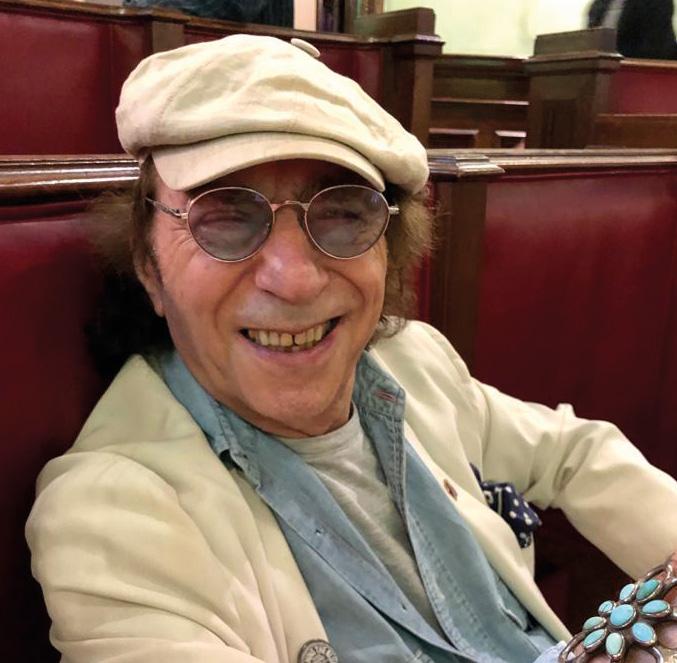
4 minute read
Harmonica Biographies
Famous musicians generate interest beyond their music. Background and major life events of the various Beatles are well known to my generation. Tabloids and social media bring contemporary stars to us, whether we like it or not. Books like the superb ‘Chronicles, Volume One’ by Bob Dylan, the surprisingly excellent ‘Life’ by Keith Richards, and the simply wonderful B.B. King's autobiography ‘Blues All Around Me’, written with David Ritz, provides a deep focus on musical icons from my era. Little was known about harmonica players when I started in the late 1970s. This changed in 1993, when Kim Field released ‘Harmonicas, Harps and Heavy Breathers’. Kim is a well known HARMONICA harmonica player and a skilled writer. His book outlines the development of the harmonica and profiles the BIOGRAPHIES key 20th century players. Some of the early pioneers, including DeFord Bailey, Herman Crook and Charles Leighton were still around when the book was written, Tony Eyres and their respective interviews are a high point. Every harmonica player should read this book, along with Kim Field's upcoming release, ‘The Blues Dream of Billy Arnold’, highlighting the sole surviving (and still performing) major harmonica player from the early 1950s Chicago scene. Electronic media provides another window into our music icons. The Musicians Hall of Fame interviews are a favourite for me, the Vince Gill ones in particular. Harmonica players are not front of mind when major outlets plan interviews, so it falls on our community. PT Gazell has done a series of interviews - a ‘Seydel Overtones’ YouTube search will find them. Hohner has a ‘Harmonica Masters’ video series, featuring their major endorsers. Howard Levy and David Barrett have done some nice interviews. The 2020 COVID lockdowns accelerated online projects by necessity. Tomlin Leckie has become one of the more prolific online harmonica teachers; in 2020 he started a podcast series with well known players. There are now around twenty episodes, each around an hour featuring icons such as Adam Gussow, Brendan Power and Jason Ricci. They are easily found on YouTube. 2020 brought another harmonica podcaster to light: Neil Warren. Neil is well known in UK harmonica circles, has won the HarmonicaUK championship several times, and has harmonica transcripts at harptranscripts.co.uk. His name rang a bell when he contacted me last month, to ask if I would like to be in his Happy Hour Harmonica podcast series. I replied with a yes, then went online to see what I was in for. Starting in April 2020 with a Paul Lamb interview, Neil has done 45 podcasts to date. Google ‘Happy Hour Harmonica’ to find them. Similar to Tomlin Leckie, Neil keeps his guests for around an hour. His cast is impressive, and includes Howard Levy, Charlie McCoy,
Kim Wilson and Rachelle Plas. I listened to a few to get up to speed, and found them compelling, in particular Jerry Portnoy, whose career spans the Muddy Waters band to Eric Clapton, and includes lessons from Walter Horton. Carlos del Junco was another fascinating interviewee, likewise Joe Filisko.
Advertisement
Neil prepares his interview well. His understated style draws his subjects out, and reminds me of Michael Parkinson. A key feature is the musical excerpts which compliment the stories. An hour is a long chat, so Neil structures his interviews carefully, to cover early beginnings, major career points, recordings, playing styles, equipment and a final segment on "what would you do if you had ten minutes to practise?"
I had a sinking feeling that my interview would be short unless I came up with something. I sent Neil three pages with everything I could think of. He asked for recordings of my 1980s blues band. I do have cassettes from back then, but no player. I found an old Sony Walkman, but it didn't work. Given how I sounded back then, the absence of a player was perhaps a lucky escape all round. We coordinated times (I'm in Sydney), I tested the podcast software beforehand, we overcame some technical hitches (I was too loud, a common complaint), and settled in. I found myself to be an agreeable topic, the hour passed quickly, a day or so later the editing was done and the podcast went up. I've encouraged Neil to keep at it. These projects are easily started, harder to keep going. Neil has been going for 18 months and has compiled a major resource. Another year or so at this rate and his podcasts will become the resource for in depth overviews of our generation of players.

PERFECT INTONATION
The standard Mars is tuned to equal temperament which gives a bright sound BUT now we also have ‘JUST’ intonation for that authentic Pre-War Blues sound.
20% off
Benders Harp

Order direct from our online shop
Tuned to JUST INTONATION this model is supreme at making chords sound sweet. It is the pre-war tuning used by all the great and famous recording artists up to the 1960s like Little Walter, Big Walter, both Sonnyboy Williamsons and all the other greats. As it is tuned to make the chords sweet you lose the sweetness in melody playing. For example, 5 draw will sound flat in a tune. Fine in 2nd position but less good in first position.










